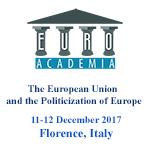Euroacademia Conferences
 Europe Inside-Out: Europe and Europeanness Exposed to Plural Observers (9th Edition) April 24 - 25, 2020
Europe Inside-Out: Europe and Europeanness Exposed to Plural Observers (9th Edition) April 24 - 25, 2020 Identities and Identifications: Politicized Uses of Collective Identities (9th Edition) June 12 - 13, 2020
Identities and Identifications: Politicized Uses of Collective Identities (9th Edition) June 12 - 13, 2020 8th Forum of Critical Studies: Asking Big Questions Again January 24 - 25, 2020
8th Forum of Critical Studies: Asking Big Questions Again January 24 - 25, 2020 Re-Inventing Eastern Europe (7th Edition) December 13 - 14, 2019
Re-Inventing Eastern Europe (7th Edition) December 13 - 14, 2019 The European Union and the Politicization of Europe (8th Edition) October 25 - 26, 2019
The European Union and the Politicization of Europe (8th Edition) October 25 - 26, 2019 Identities and Identifications: Politicized Uses of Collective Identities (8th Edition) June 28 - 29, 2019
Identities and Identifications: Politicized Uses of Collective Identities (8th Edition) June 28 - 29, 2019 The European Union and the Politicization of Europe (7th Edition) January 25 - 26, 2019
The European Union and the Politicization of Europe (7th Edition) January 25 - 26, 2019 7th Forum of Critical Studies: Asking Big Questions Again November 23 - 24, 2018
7th Forum of Critical Studies: Asking Big Questions Again November 23 - 24, 2018 Europe Inside-Out: Europe and Europeanness Exposed to Plural Observers (8th Edition) September 28 - 30, 2018
Europe Inside-Out: Europe and Europeanness Exposed to Plural Observers (8th Edition) September 28 - 30, 2018 Identities and Identifications: Politicized Uses of Collective Identities (7th Edition) June 14 - 15, 2018
Identities and Identifications: Politicized Uses of Collective Identities (7th Edition) June 14 - 15, 2018
Scramble for (EU)rope. The Migrant Crisis or The Crisis of Migrant: Europe on The Borders of Europe
-
-

-
Presentation speakers
- Igor Milić, Sant'Anna School of Advanced Studies, Pisa, Italy
- Luka Nikolić, Centre for International Public Policy, Belgrade, Serbia
Abstract:
The European Union is currently going through some serious challenges threatening its existence. But are these challenges really out there, do they really assume a prosopoetic, personalised dimension, precisely that of both a stranger and a foreigner, a migrant, in one word? Or do those ‘challenges’ actually challenge the idea of a sovereign challenge, challenging, in turn, the challenged sovereignty? The only certainty is that this crisis turns out to have characteristics of a psychosis. If there is, on the one hand, the idea of Europe as a normative and a civilian power, a claim of universalism, a (sovereign) Eurocentric thought, its whole essence stands in the indeterminateness of the ‘a’, contending thus with the idea of unconditionality: as Derrida puts it – ‘Can there be an unconditionality without sovereignty?’. Is the Question of the Migrant a question of the Legislator, posed by the Legislator who recognises it as a question, or is it actually an always-already recognised question, a question of the Migrant, belonging to the Migrant? To what extent can Europe allow itself to think unconditionally today when many interests are at stake? As the title goes, we cannot determine, without a reasonable doubt, whether migrants are engaged in a crisis or this crisis is pertinent to the notion of migrant itself. Being the one who migrates, who moves and sometimes escapes means to have freedom of going further, both in a quantitative and a qualitative sense. United Europe stands for a wall, for a symbol of freedom extinguisher, for an entity which precludes a migrant their status, for a particularity so characteristic for universality. The migrant crisis is not just a consequence of a bad policy in Europe, it is the very indicator of always-already non-existent European sovereignty. A cause and a consequence, the cause of a consequence, a cause after a consequence. The cause caused by a consequence of Europe on the borders of Europe.
-
Related Presentations

Paris as a Scenery of Rebelliousness During the Inter-War Period (1918-1933)
- Andrea Victoria Russo













